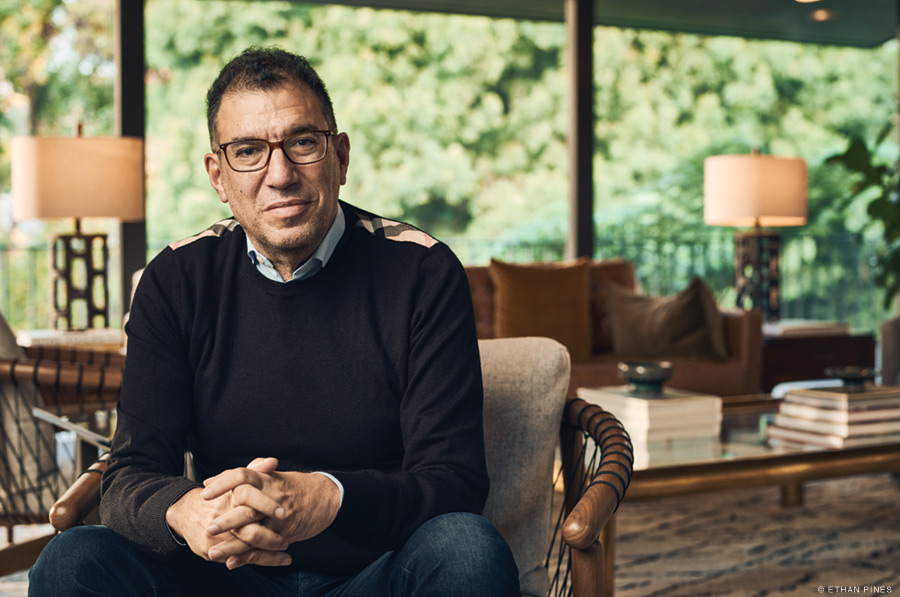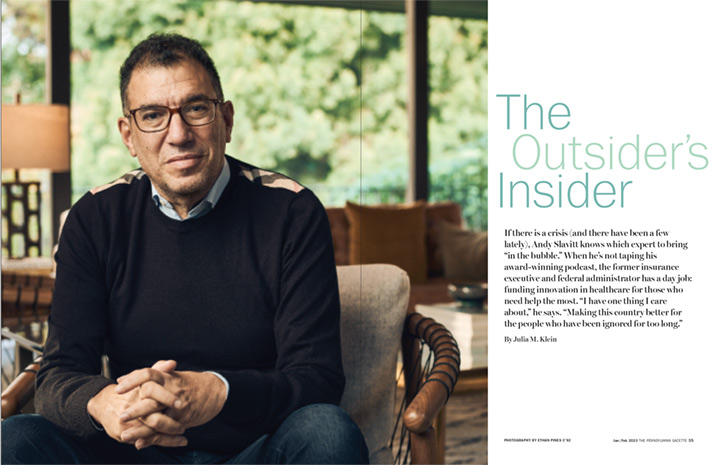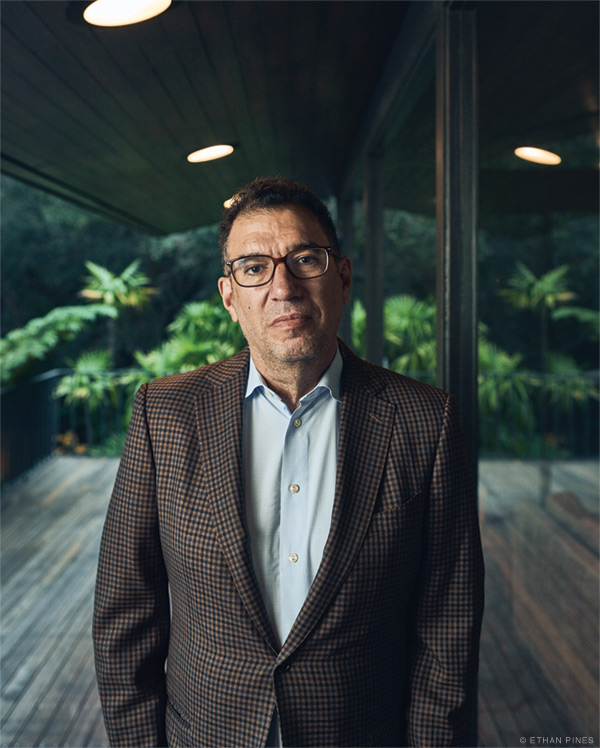
If there is a crisis (and there have been a few lately), Andy Slavitt C’88 W’88 knows which expert to bring “in the bubble.” When he’s not taping his award-winning podcast, the former insurance executive and federal administrator has a day job: funding innovation in healthcare for those who need help the most. “I have one thing I care about,” he says. “Making this country better for the people who have been ignored for too long.”
By Julia M. Klein | Photography by Ethan Pines C’93

Remember lockdown? Back in March 2020, the supposedly inessential among us were mostly home, looking for something to do. Something safe. Something novel. Maybe even something related to the pandemic. Holed up in a Minneapolis suburbwith his wife and two sons, Andy Slavitt C’88 W’88 was no different. Except, of course, for having more famous friends.
“This little thing was actually my son’s idea,” Slavitt recalls. That would be Zachary Slavitt W’24, who one day said: “Dad, why don’t you do a podcast?”
“He just heard me all day long talking to people: White House and government officials, scientists and politicians. He said, ‘Dad, just have those conversations on the air.’ If there hadn’t been a void, there would have been no need,” says Slavitt, who detailed his role as “part-time helper, part-time critic, and full-time public chronicler” of the pandemic in his 2021 book, Preventable: The Inside Story of How Leadership Failures, Politics, and Selfishness Doomed the U.S. Coronavirus Response. “For a while, there was a huge void, and it was getting filled slowly and surely by misinformation, by misunderstanding.”
Long before founding his own healthcare company and his high-profile experience as a White House administrator and advisor, Slavitt—the editor of his high school newspaper—had envisioned becoming a journalist, perhaps (after seeing Peter Weir’s 1982 film The Year of Living Dangerously) a foreign correspondent. The podcast would be his grown-up twist on that teenage dream—a chance, as he saw it, to allay pandemic anxieties and misconceptions with information, inspiration, and humor. Plus, he would learn a lot. “I really was excited by that idea, by storytelling, communication, the adventure of it,” he says. The formula, he decided, would be a somewhat improvisational blend of Winston Churchill and Fred Rogers, interspersed with “dad jokes.”
On April 1, 2020, he launched In the Bubble with Andy Slavitt, a pandemic-focused podcast for Lemonada Media that sometimes wandered into other topics. It featured his son Zach, who handled the statistical chores until Penn beckoned, and a parade of high-profile guests that included Tina Fey, Chelsea Clinton, Pete Buttigieg, Bernie Sanders, and Beto O’Rourke. CNN chief medical correspondent Sanjay Gupta Zoomedin, and so, too, did Anthony Fauci, director of the National Institute of Allergy and Infectious Diseases and perhaps the ultimate COVID celebrity. But Slavitt got his biggest audience, he says, for a supremely practical discussion with former Harvard epidemiologist Michael Mina about the mechanics of rapid testing.
The twice-weekly program, with Slavitt’s share of the sponsorship proceeds ($200,000 and counting) going to philanthropic causes, took off. At times, it was the third-most popular news podcast in the country, trailing only the New York Times’s The Daily and NPR’s UpFirst. In April, In the Bubble received a prestigious 2022 Webby Award as the best “Health and Wellness” podcast. The 56-year-old Slavitt was one of five nominees for best podcast host, runner-up in the popular vote to comedian Conan O’Brien. In May, In the Bubble expanded to three times a week to cover a range of social and political issues, from climate change and gun control to abortion rights and the midterm elections.
The key to his success, says Slavitt, has been using his prodigious Rolodex—the product of a high-powered education, business connections, years of government service, and the sheer love of schmoozing—for the public good: “The conceit was, I don’t know any more than you do, but what I probably have, unusually, is access—to pick up the phone and be able to call and get my phone call returned from anybody. And many of them”—all those top scientists and government officials—“were calling me because they were trying to figure out what was going on.”
For the podcast, he says, “I was notgoing to be an insider. I was going to be an outsider’s insider.”
Slavitt is recounting this origin story in the sleek, elegant SoHo headquarters of Town Hall Ventures, the healthcare venture capital company he cofounded in 2018 to fund and advise healthcare innovators helping underserved communities. The point is to bridge gaps in the Medicaid and Medicare safety nets, to do well by doing good.
Town Hall’s portfolio of “visionary entrepreneurs” includes Cityblock Health, which uses technology and local providers to reach urban populations; Quilted Health, which focuses on maternal care in communities of color; Zing Health, an Illinois-based Medicare Advantage plan founded by Black doctors; and Plume, which offers gender-affirming care to the trans population.
So far, Town Hall Ventures has about a billion dollars’ worth of investments in 30 US companies, serving more than 3 million people and, in some cases,Slavitt says,“providing better care in their communities than you and I receive.” Town Hall teammembers tread a fine line, adjusting to the different personalities and problems they encounter, offering advice without, Slavitt says, “telling the companies what to do.”
“We lean on them for their expertise and insight,” says Anna Lindow, cofounder and CEO of Brave Health, which delivers “telehealth-enabled” mental healthcare in 18 states. “This is about building a partnership.”
The Town Hall Ventures office fills the top floor of a renovated industrial building in one of New York’s toniest neighborhoods. An elevator goes directly from the street to a loft space bathed in light and decorated with mirrors and abstract art. Along with banks of computers, it has seating areas with inviting chairs and couches, a glass-walled conference room, and a makeshift podcasting studio. Preventable sits on a coffee table. One corner houses a bathroom with a shower and a kitchen whose treats include freeze-dried espresso. Slavitt, whose normal base of operations is southern California, can’t quite master its preparation.
In this era of remote work, says Slavitt, “you actually have to create a space where people would rather be than their own couch. People show up here because they love it.”
Slavitt’s September trip to the East Coast combines business and pleasure. He and his wife have just returned from visitingZach at Penn. In New York, they attended the US Open to celebrate their 26th anniversary. Along with working on Town Hall projects, Slavitt is taping two podcasts, freewheeling conversations conducted over Zoom and released days later with minimal editing.
“I have to have lunch with that woman who just came in,” Slavitt says as he wraps up an interview. Colleagues joke that their boss, forever shuttling between projects, invariably runs a few minutes late. Later, Slavitt mentions that the woman he kept waiting was “the First Lady of Connecticut,” wife of Governor Ned Lamont. Annie Lamont, a venture capitalist, is a Town Hall investor, and both Lamonts are Slavitt’s friends.
Over the years, Slavitt’s career has toggled between private and public, profitable and service-oriented. Stints in investment banking and consulting, along with a Harvard MBA, positioned him for a lucrative business career. Tragedy impelled him to start his own patient-centered healthcare company, eventually acquired by UnitedHealth Group, where he became a top executive.
In 2013, with no tech background, he volunteered to lead the rescue of the Affordable Care Act’s glitchy marketplace website [“Profiles,” Mar|Apr 2014]. “So began,” he recalls, “the craziest ride of my life,” an exhausting deadline sprint against the odds that convinced him that he was “pretty good at leading through a crisis and at managing a very complex situation.”
That feat impressed others as well, including President Barack Obama, and led to an even bigger challenge: running the Centers for Medicare and Medicaid Services (CMS), the multibillion-dollar US healthcare bureaucracy. He would return to government briefly in 2021 to advise the Biden administration on the COVID vaccine rollout.
In between, Slavitt held town hall meetings to promote the ACA, wrote his book, moved to Pasadena, and helped launch an ambitious series of healthcare-related enterprises. Along with Town Hall Ventures, named for those town halls, he cofounded the Medicaid Transformation Project, a national effort to improve Medicaid delivery, and the United States of Care, a nonprofit dedicated to healthcare reform.
In the musical Hello, Dolly!, the meddling (but lovable) matchmaker Dolly Levi sings: “I put my hand in here, I put my hand in there.” Slavitt, in the early months of the pandemic, took a similar tack. A Democrat with no official position or authority, he was nevertheless frequently on the phone with Jared Kushner, the president’s son-in-law and senior advisor, trying to help the Trump administration manage the public health crisis. He and his colleagues tracked down ventilators, tests, and masks.Even before launching the podcast, he was composing nightly Twitter threads and appearing on cable news shows to promote a “Stay Home” campaign. In August 2021, Vanity Fair proclaimed him one of the pandemic’s breakout stars.
The progressive-minded tech billionaire John Doerr, who met Slavitt in the course of the ACA website fix, joined him in pandemic-related brainstorming sessions. “We had more than a few phone calls that would go late at night with Andy and his crew of advisors and advocates to try to develop science-based recommendations of how health authorities and the American public ought to behave,” says Doerr, chairman of Kleiner Perkins, a West Coast venture capitalist firm, and an investor in Town Hall Ventures.
“It was a marvel to witness Andy Slavitt in action—he was a man possessed,” says Doerr, whose own passions include climate change and pandemic preparedness. It helped, he says, that Slavitt was “trusted by leaders across the political spectrum,” and periodically sought after for advice. Michigan Governor Gretchen Whitmer, New Jersey Governor Phil Murphy, and US Senator Amy Klobuchar of Minnesota all ventured In the Bubble.
Sylvia Burwell, Slavitt’s onetime boss as US Secretary of Health and Human Services and now president of American University, credits Slavitt with an important role in the implementation of the Affordable Care Act. “When you sign up to come to [the Centers for Medicare and Medicaid Services], you jump in the deep end of the pool,” she says. “I couldn’t have asked for a better partner at a time when it was really hard. He’s a great partner when everything around you is swirling.”
Burwell says she still relies on Slavitt’s advice, including on a recent healthcare-related issue. He is “a person who cares deeply,” who is “using his incredible skills and talent for others,” she says. “And doing that makes Andy happy. He’s a servant leader—and that may not have been obvious.”
Ted Meisel, a healthcare entrepreneur who met Slavitt in the 1990s and has partnered with him on the Medicaid Transformation Project and other ventures, says that Slavitt’s most recent activities have taken him by surprise. “Earlier, I didn’t know Andy to be that person that would be communicating with people broadly, being a man of the people translating complex topics to simple ones, getting out on the road,” Meisel says. “I have a feeling there’s some transformation there.”
“I have a purpose,” Slavitt explains. “I have one thing I care about, which is helping to transform the country—starting with healthcare, but really the threads are making this country better for the people who have been ignored for too long.”
Slavitt’s initial career path was informed by his Ivy League education and middle-class upbringing in Evanston, a lakeside suburb of Chicago. He inclined, always, toward success. But his passion for creating a more equitable society—in which healthcare is more affordable and accessible—would come later, part of what he describes as an evolution in his values.
Slavitt depicts his mother, Beth Slavitt, a homemaker who has been featured on In the Bubble, as “incredibly supportive.” His late father, Earl B. Slavitt W’61 L’64, was a real-estate lawyer, “very tough and disciplined,” but also loving. (His parents divorced when Slavitt was in high school.) Earl Slavitt died of cancer in 2003, and an obituary notice in the Chicago Tribune says he spent “countless hours providing hospice services to AIDS patients, supporting battered women, and mentoring children.” His humility and dedication to community service exerted a strong influence on Slavitt, who still talks of him with visible emotion.
“I really admired my dad in many respects. I like to tell myself he would have been proud of me for achieving these things and having an impact and knowing what matters,” Slavitt says. “I carry that around.” Two days after his father’s funeral, he acquired a Superman tattoo in his honor.
Slavitt says he was attracted to Penn by the campus’s urban grittiness and beauty. “I found it energizing,” he says. At his father’s insistence, he earned a degree in English as well as from Wharton—a double track that he says has served him well. Slavitt also spent time on community service activities. And, in 2013, the 10th anniversary of his father’s death, he launched the Earl B. Slavitt Civic Engagement Education Program, in which Penn students teach reading to West Philadelphia schoolchildren.
“When I graduated from Penn, the job I wanted”—on Wall Street, at Goldman Sachs—“was the job I thought I was supposed to want,” Slavitt says. “Just to tell you how I was wired back then, which is different than I’m wired today: Someone told me that it was the hardest job to get coming out of Wharton. I didn’t know what investment banking even was. But I knew that everybody wanted to work [at Goldman], and the smartest person in my fraternity had a job there.”
After two years at Goldman’s New York office, and another in Los Angeles, Slavitt once more did the expected thing by attending Harvard Business School. After graduation, he joined the consulting firm McKinsey & Company, another unsurprising move. (He met both Meisel and his wife, Lana Etherington, now a grassroots activist focused on gun safety,at McKinsey.)
So far, says Slavitt, “it’s the least interesting career story you’ve ever heard.”
Then, in January 1998, at age 31, his college roommate, Jeff Yurkofsky C’88, was diagnosed with brain cancer while completing a post-residency fellowship in orthopedic surgery. The end came quickly: Yurkofsky died that July, leaving behind a wife, one-year-old twins, and, despite having health insurance, about $60,000 in medical debt.
As Slavitt recalls, Yurkofsky had told his wife: “If something happens to me, Andy will take care of everything.” And he did. Yurkofsky’s widow, Lynn, and the twins relocated from Baltimore to live with Slavitt’s family in southern California until they regained their financial footing. Slavitt helped Lynn fend off debt collectors and bankruptcy. And he and other Penn friends covered the twins’ college costs. Yurkofsky’s daughter, Judy, is now in her first year of medical school; his son, Josh, is an engineer.
Yurkofsky’s death, and the financial devastation it caused, spurred Slavitt to start HealthAllies, his first major foray into healthcare. The company’s mission was to persuade hospitals, doctors, and other providers to offer services to uninsured or underinsured patients at the lower negotiated rates they were charging insurance companies.
In 2003, Slavitt sold the company to UnitedHealth Group. “It needed a bigger platform,” he says. He moved to Minnesota to become an executive at UnitedHealth. The company’s Ingenix subsidiary, which Slavitt headed, already was embroiled in litigation over a database that insurers used to pay out-of-network claims. Multiple lawsuits charged that patients had been saddled with an unjustifiably large share of their medical bills. In 2009, UnitedHealth settled a class-action suit, agreeing to pay $350 million to customers and providers. Slavitt says that the database represented a small share of Ingenix’s business and, in testimony before Congress, denied any wrongdoing.
Optum, a UnitedHealth subsidiary where Slavitt was group executive vice president,was one of the contractors responsible for the ACA website. Its data exchange function was, according to Slavitt, “the only part of [the website] that was actually working.” But because of that involvement, Slavitt says, the healthcare portal’s disastrous debut hit close to home. “I very much believed the government could not be looked at as failing, or we would never get a chance again to solve these problems,” Slavitt says. He volunteered to pitch in, not expecting the government to take him up on the offer. “What I didn’t realize,” he says, “was that not a lot of people were raising their hands.”
The White House announcement in October 2013 that Slavitt and a team from Optum would lead the fix of HealthCare.gov also promised that it would be completed within five weeks. That was news to Slavitt and made him “furious” at first. “It ended up being the greatest favor they did us,” he says, because it forced an intense focus on the task at hand. “We’re not going to work smart—we’re going to work hard,” he told the team of engineers.
Slavitt lived out of a Virginia hotel room, often sleeping “no more than 1 hour and 59 minutes” a night because of regular White House calls. “This was the most watched technology project in the world,” he says. “As I’ve said to people, almost every technology project of scale fails in some form. Very few of them fail a) so spectacularly, and b) so publicly, and c) with such accountability. I mean, literally anybody in the country—any reporter, any senator—could get on the website and find out whether or not it was working.”
When he started on October 24, the site had 6,000 bugs, Slavitt says. When he surfaced long enough to call his wife on November 12, he was in despair. There were now 8,000 bugs. “I’ve made it worse,” he told her, as she tried to reassure him. “I’ve sunk this thing.”
Part of the solution, it turned out, was to buy new hardware. Because government procurement processes would have been too slow, he pulled out his Optum credit card. (The government eventually reimbursed him.) “Two days later,” he says, “there were massive increases in productivity,” and by the December 1 deadline, tens of thousands of people per day were signing up for coverage.
After that success, Slavitt moved to CMS as principal deputy administrator and, in 2015, acting administrator. (The Obama administration never sought to make the position permanent; Slavitt says he advised not wasting political capital on a confirmation fight.) Overseeingimplementation of the Affordable Care Act was part of his bailiwick, along with Medicare, Medicaid, and other programs, amounting to about one-quarter of the federal budget.
“It was a huge leap,” Slavitt says. “I was absolutely petrified that I’d made a huge mistake.” The day he started—“and this is going to sound hokey,” he admits—he saw an American flag behind his desk. “That American flag told me I am here for two years to do service. I felt very deeply this sense of service and patriotism.”
Before Slavitt took over, CMS “was a really exhausting place to work,” says Natalie Davis, who had been a career civil servant. As he was arriving, she was leaving, or so she thought. She met with him over coffee to wish him luck. She says she told Slavitt that “the culture [at CMS] needed some new excitement and thoughtfulness and appreciation.” He persuaded her to stay on as a senior advisor.
With Davis’ help, Slavitt held staff meetings to foster camaraderie, as well as smaller brown-bag discussions of successful projects. “He often sent handwritten notes thanking people for their work,” Davis says.
Slavitt traveled widely, visiting CMS offices, hospitals, clinics, and public officials across the country. And he decided—“against everyone’s advice,” he says—to make his private email address public. People would write to report abuse at a nursing facility, or maybe just complain that their wheelchair battery had died. He says, “They would get a response five minutes later, saying, ‘So sorry you’re dealing with this. We’re all over this.’” Convinced that CMS regulations were overly burdensome and convoluted, he worked with his staff to eliminate or simplify them.
Another accomplishment, Slavitt says, was helping to secure Medicaid expansion in “seven or eight”Republican-run states that had resisted it. He also oversaw a transition to more “value-based care” that prioritized good health outcomes over fee-for-service medicine. And he dealt with the Flint, Michigan, water crisis caused by lead-pipe poisoning, ensuring that children affected by the crisis would receive free medical care until they were18. One remaining challenge was remediating the pipes. CMS, unlike other agencies, had the money. But, according to the lawyers he consulted, it lacked the authority. Slavitt went ahead anyway, taking what he called “a serious oversight risk” that, fortunately, never materialized.
After CMS, Davis would join Slavitt in creating a slate of new enterprises: Town Hall Ventures, the Medicaid Transformation Project, and the United States of Care, where she is now CEO. “He runs toward the hardest problem,” she says of Slavitt.

After Donald Trump W’68’s surprise election in 2016, Slavitt quickly found a new calling: holding town hall meetings in support of the endangered Affordable Care Act. He traveled to districts whose representatives had voted to “repeal and replace” it and invited them to join him, saying he would cede them the stage. None took him up on the offer.
“I don’t think I swayed hearts and minds,” he says of the gatherings. But the stories he heard changed him. They showed how important it was not just to pass legislation, but to craft the right narrative. “The thing people responded to, above all else, was pre-existing condition protection,” he says. “There was a message to land on.”
The town halls were popular, garnering him Twitter followers and favorable press attention. He says they also changed the conversation in Washington. STAT, a publication covering health, medicine, and the life sciences, called Slavitt “a wonk-turned-evangelist.” In August 2017, Slavitt told the New York Times: “If you give me 15 minutes, I can create a common bond around a story of the healthcare system with almost any American.”
At the time, “everyone thought I was running for office,” Slavitt says. When Joe Biden was elected president in 2020, Town Hall Ventures investors expressed a different concern: “The one question that all of them asked is, ‘Are you going to become health secretary?’ Because that was the rumor.” He promised he wouldn’t.
Slavitt had serious Bidenworld connections, including friendships with incoming White House chief of staff Ron Klain and incoming coronavirus response coordinator Jeff Zients. So even before Biden took office, the calls, he says, started coming: Would he join the new administration? The early vaccine rollout was a disaster. Could he perhaps lend a hand?
Slavitt demurred. He had just moved back to California, he was busy with his own healthcare ventures, and his book on the pandemic was due out in March. Beyond its criticism of the Trump administration’s denialism, the book argued that the pandemic had preyed on the country’s frayed social fabric, economic and racial inequities, and political divisions, as well as the idea of American exceptionalism. In depending on “cooperation and our ability to care about one another,” Slavitt says, “we were relying on our own weakest links.”
When the Biden team kept calling, Slavitt, impressed by the urgency of the situation, finally said yes. “The whole country was at a standstill, 4,000 people a day are dying, no one’s getting access to vaccines,” he says. Plus, “I had had prior government turnaround experience,” he notes, referring to his HealthCare.gov rescue.
Bumping his book’s publication to June, he signed on for a four-month stint as a senior advisor on the coronavirus response team. During that time, he became a regular presence at press briefings, joining Fauci and Rochelle Walensky, director of the Centers for Disease Control and Prevention.
He also worked furiously behind the scenes to ramp up vaccine supply and access—and combat what would soon materialize as an even more vexing problem: vaccine hesitancy. “Half of the job was, fix the supply side,” he says, which entailed opening mass vaccination sites andending vaccine hoarding with guaranteed deliveries. “The other half—which nobody could see yet, except I could, a few of us could— was that once we fixed the supply side, we were going to hit a point where we had more supply than demand. So we started working on the demand side at the same time.”
That job arguably remains unfinished, especially among young adults and children.But at least in communities of color, where the government enlisted trusted local voices to make the case, vaccine uptake quickly began improving. “I learned in that experience definitively that you can close equity gaps,” Slavitt says.
The two podcasts Slavitt is about to tape, with a few written questions to guide him, illustrate the show’s range.
“One is easy to prepare for, one harder,” he says. The easier one will feature Ashish Jha, the White House COVID-19 response coordinator. Two days earlier,at a press briefing, Jha had discussed the availability of the new bivalent booster. That wasn’t news to Slavitt. “We collaborated on how he’s rolling it out,” he says.
For an actual journalist, that might constitute a conflict of interest, but Slavitt is comfortable with his “outsider’s insider” role. “Every big decision, you have five or six people you call. I’m just one of those people for him. You get very myopic when you’re in the White House,” he says. “He keeps an open dialogue with me.”
The second conversation is with Dahlia Lithwick, who covers the US Supreme Court for the online magazine Slate. That interview, in the immediate aftermath of the Dobbs decision overturning Roe v. Wade’s guarantee of abortion rights, “may be better,” Slavitt says. “I get to start with a blank sheet of paper at 30,000 feet and say, what does this audience care about? And what should we care about? And what could she help us convey and understand in real depth? That’s the fun part for me. I get to learn. To be able to jump on all these new learning curves—it’s a total gift, a blessing, a privilege.”
For a while, Slavitt wondered whether his listeners would want to hear from him on topics other than the pandemic. But survey responses were encouraging, and he says his audience actually has grown. In the Bubble now averages about a million downloads a month.
“The podcast world is filled with a lot of people who have a lot of really strong opinions and want to hear their own voice, that are very sharp-edged politically and want to get people to listen to them because it ratifies their point of view, and it makes them even more certain of the things they were certain of. And there’s a big market for that for sure,” he says. “We don’t do that.
“It’s not that I don’t have opinions,” he says. “My goal is that in this world we live in, which is chaos, to give people a sense that you can get through crisis—and there are helpers, people who genuinely care.”
Not every show has worked, Slavitt says. Sometimes, he feels “like I’m not curious enough, or I can’t engage the guest. Or I just picked the wrong guest. Or the wrong topic.” One miss, he says, was a show on male birth control. Though the science was interesting, he later thought: “This doesn’t help the problem. Women are not prepared to make this the answer to the Dobbs question. I would have rather done a story about girls in the South that get pregnant either through incest or rape.”
When it comes to healthcare, Slavitt says he has been criticized for not publicly endorsing Medicare for All. “The devil—and the beauty—is in the details,” he says. “Being called an incrementalist to me isn’t an insult. Sometimes you’ve got to be an incrementalist. Sometimes you’ve got to be a visionary. I’m not going to stand out there and say I want a perfect system. I’m going to stand here and talk about how we build a better one.”
Julia M. Klein is a frequent contributor to the Gazette.





This piece is quite hagiographical for a person who pushed lockdowns, vaccine mandates, and school closures — all highly controversial policies that likely did significant harm in different ways — during the pandemic. Certainly, the part about him taking care of his classmate’s widow and family is nice.